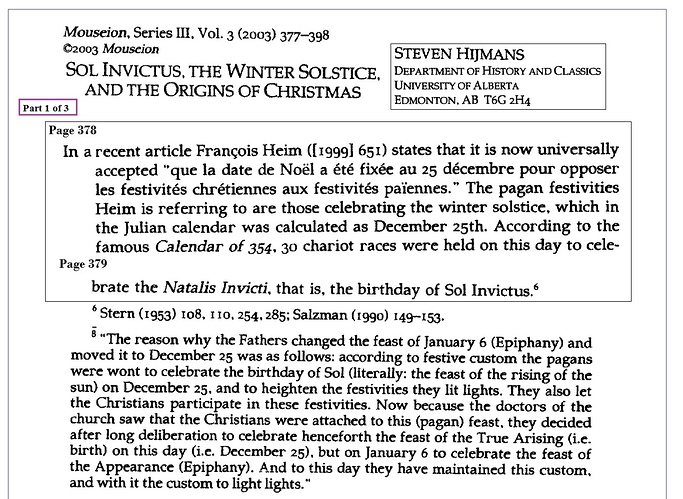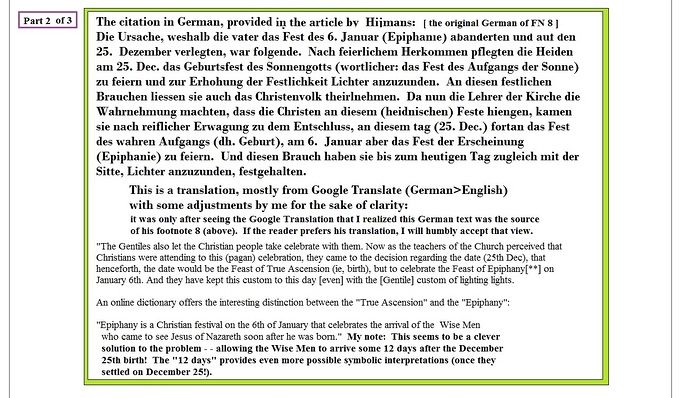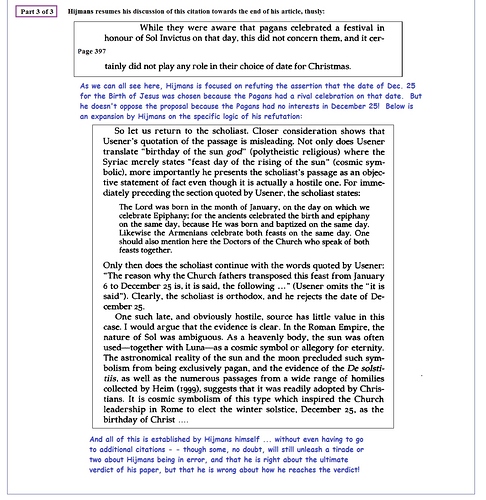I strongly advise you to take a “longer view” about the people with whom you correspond here at BioLogos. It is not wise to work yourself into such an awkward corner, even if you really, really, really think you are right.
You have seriously challenged me on a point of history about which I am relatively knowledgeable… with bold indictments that my view on ancient pagan interest in the Winter Solstice (or more specifically, December 25) is a Fiction… indeed, even an intentional lie by those who hate Christianity. And that I’m just foisting this lying fiction on a beguiled audience.
But your command of the facts, which could give you at least a plausible standing to make such accusations, is terribly flawed - - despite several attempts by me to send you in the correct direction!
Below are three parts of my response to your egregious accusations. It is based purely on an examination of Hijmans’ article from 2003 - - which in the several subsequent years even Hijmans, no doubt, has supplemented with more investigation and fact finding.
But my enabling your lack of general comprehension regarding astronomy (then and now) and the symbolic importance of elements of astronomy will end with Hijmans. If you want to impress me or anyone else, you will need to do your own investigating into the evidence to prove your charges (assuming Hijmans is actually insufficient to bring you out of darkness into light). He is no friend to my position, as you should know. And yet even he does not attempt to argue that the pagan connection to December 25 is a fiction. I would think his academic efforts would be enough to bring this episode to an end.
If I am wrong in my expectations, and you still think you have the capacity to demonstrate mine and Hijmans’ serious error in analysis, perhaps you could revisit your review of the term:
“Solstice”, in general, and “-stice” specifically.
Academics have pointed out that the English word is ultimately based on the Latin term for what could be translated as “Sun Standing Still”:
“Sol-” = Sun and -stice being a suffix variant of the Latin term for “to stand”.
You may recall your posting about your research into the root term “stice”; surely a sincere but badly executed effort.
For goodness sakes, man! At the very least, your tracing of the root “stice” to “sting” will make a great conversational topic at the annual “False Etymological Methodology” conference for years to come!
All you had to do was scroll down to the Etymological section of the dictionary page on the internet … and you would have seen it for yourself! As a courtesy, I provide the actual etymology for your review a little further below.
By the way, the reason modern dictionaries don’t equate the Winter Solstice with December 25 (or even mention it) is modern audiences have the benefit of exact astronomical instruments and precise math to assign the term “Winter Solstice” to the precise and single day on which the Sun rises at the southernmost part of the morning horizon!
As others have mentioned, the sun does start its progress back northwards beginning the very next day, but by such a tiny amount, the appearance is that the Sun is in a pause - - a pause of 3 days. Thus the ancients sometimes considered the entire 3 day period as the “solstice”. Prof. Hijmans himself, in the conclusion of his 2003 article, actually refers to the Winter Solstice as December 25 (either because this was a common practice by the classical societies and/or he didn’t, in 2003, know the full details of the sun’s behavior).
In any case, I will tell you (for your sake) the better approach is to look for an etymology of the original English word, so that you can benefit from the work of generations of linguists who have the experience to know where “stice”, in this very specific case, comes from. Looking up “stice” really isn’t going to cut it.
Here is what Dictionary.com tells the reader (frequently the internet dictionaries provide more than one version of the Etymology of a word, so be ready for that as well):
First used in 1200-1250; < Middle English
< Old French
< Latin sōlstitium, equivalent to sōl sun + -stit-, combining form of stat-,
variant stem of sistere to make stand (see stand) + -ium -ium; see -ice)
Dictionary.com Unabridged - Based on the Random House Dictionary, © Random House, Inc. 2018.
SOLSTICE Definition & Usage Examples | Dictionary.com
Related Anecdote:
It is not unusual for the modern citizen to be unaware of the origin of such linguistic roots as
“sis”, as found in the name “the Sistine Chapel”. It certainly is not a reference to a Pope’s sister!
“Sis” comes from a Pope’s name - -
Word Origin and History for Sistine
first used in 1769, literally “pertaining to Pope Sixtus,” from Italian ‘sistino’, from ‘Sixtus’,
name of five popes, from Latin sextus “sixth” (see Sextus. My note: a name unimaginatively
given to one’s 6th child!).
The “chapel” is named for Sixtus IV (Francesco della Rovere), pope 1471-84, who had it built. The painting by Raphael known as the Sistine Madonna is so called because it also shows Sixtus II, a 3rd century martyr and saint…"
But enough of the entertainment. Below are my three parts from a review of the Hijmans 2003 article on
Jesus and December 25!
.
.
.
.
.
.


